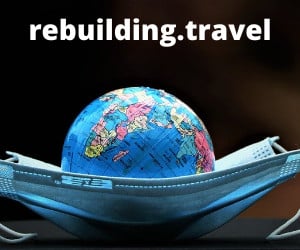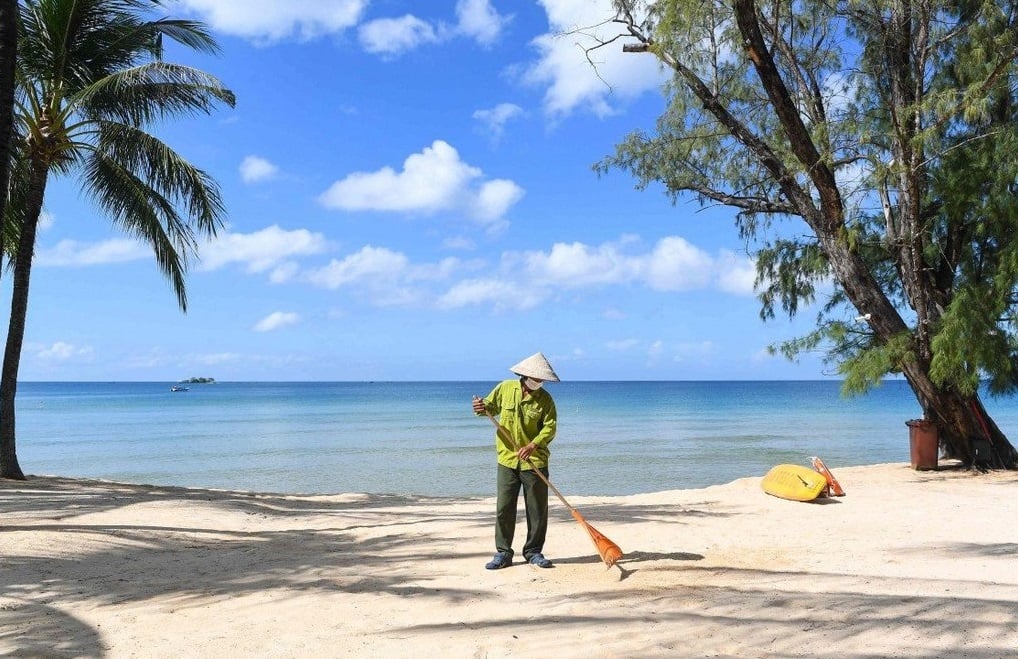Marriott, Hyatt, IHG, Hilton, Wyndham, Corinthia Hotels and Resorts are getting ready to reopen or are already reopening some of their properties in times of a new normal in the travel and tourism industry. Breathing air in such hotels, on subways, in shopping centers can still be deadly, and this article shows how.
Elinor Garely is a New York Manhattan-based writer for eTurboNews, Wines.travel, and an expert in hotel and resort security. According to her research and opinion, she shares this OP-ED:
As I work my way through press releases sponsored by domestic and international hotels informing me that they have transformed their properties into safe havens, with spaces so clean (and forgive me for a slight exaggeration) we can relax and not worry about plagues and pandemics, “Trust us!”
Kudos to the hotels for finally “deep cleaning” properties that have not had a serious approach to hotel sanitation since opening, a recent visit from a CEO, and/or a major investor. Finally – dirty/stained/moldy carpets are being removed (they should not have been used in the first place), years of dust and air particles that lived in the drapes and on the window curtains are finally becoming part of history; discolored/smelly bed covers and incredibly gross pillows are being tossed, while bathroom water glasses are being replaced with disposables, the TV control is on your smartphone app, and, in a few instances, entry/exits are being controlled through smartphones or facial recognition and elevator buttons have been replaced with foot pedals in a Thailand mall, “…it’s safer for shoppers not to get infected” according to Prote Sosothikul, Vice President of Seacon Development Company Limited.
Press releases assure me that door handles are being sanitized (every few hours does not make we feel safe), shields at the Front Desk separate me from the staff (but does not reassure me that they are healthy and will remain that way for my entire visit); menus have been replaced with electronics (please just let me access the menu on my cell phone) and the wait-staff will be wearing face masks (replaced hourly/daily/weekly? Who knows!)? Repeatedly I am assured that the properties are following Center for Disease Control (CDC), or other international governmental agency guidelines and thus I can relax and enjoy my visit, germ-free (or rather germ-reduced).
Really! Trust You?
Why there is a belief among hotel executives that I should trust guides lines issued by any government or private enterprise continues to perplex me; after all, none of the government agencies or corporations have gotten the call correctly since the beginning of the crises (if they had, we would not have a pandemic).
China decided to keep their emergency a secret (until they couldn’t), the WHO decided to keep the Chinese secret to themselves (until they could not), the heads of governments for Italy, France, the United States, and just about every other country…all missed (or ignored) the cues that could have saved millions from illness and/or death. Pharmaceutical companies are promoting drugs that are ineffective (or dangerous), while face mask companies are selling defective masks to front line health care workers. So, when hoteliers tell me that they are following government guidelines, excuse me when I do not get enthusiastic and hurriedly make a reservation.
In addition, doctors, scientists, and corporate executives interviewed (repeatedly) on television and clogging my inbox with their blogs appear to be as clueless as everyone else. They speculate, changing their opinions hourly, and are most interested in hyping their current book or looking for additional funding for their speculative research.
Beyond Foggy, Spraying, Wiping: HVAC and UV
With all the fogging and spraying and use of chemicals on every inch of a hotel surface (at least the ones a guest can see), major components of the hotel operating system have not been addressed (or ignored): the HVAC and UV light systems.
In the Air
We can debate whether the Coronavirus lives on surfaces for minutes/hours/days; however, what is not debatable is the fact that the bug is airborne. Pathogen dissemination through the air occurs through droplets and aerosols typically generated by coughing, sneezing, shouting, singing, breathing, talking, toilet flushing, or a medical procedure.
Most of the larger droplets fall to a surface (gravity) and land within 3-7 feet of the original source. General dilution ventilation and pressure differentials do NOT significantly influence short-range transmission. However, smaller infectious aerosols, including droplet nuclei resulting from a dry environment can be affected by airflow patterns in space in general and airflow patterns surrounding the source in particular. Small aerosols can stay airborne and infectious for long periods of time (minutes/hours/days) and travel longer distances while infecting secondary hosts, who had no contact with the primary host.
A recent study (Evidence for probable aerosol transmission of SARS-CoV-2 in a poorly ventilated restaurant) highlights the fact that the dining spot in Guangzhou had a poor ventilation system and was, in fact, 10 times lower than the ventilation rate advised by most authorities and professional associations.
The study also discusses how Ventilation Systems are an important resource to clean indoor environments from contaminants, including viruses, because of its ability to extract indoor air and introduce filtered air from the outdoor environment. In reality, once a SARS-CoV-2 positive individual enters a building, the only way to minimize the possibility of infection for others is CLEANING indoor air through ventilation systems.
HVAC Stars
The importance of air conditioning, heating, and ventilation systems should not be underestimated (although they have) in controlling the spread of the Coronavirus. The velocity of the spread of the pandemic demonstrates the risk of infection in public confined spaces and must not be ignored. The AIRBORNE transmission of the virus is considered the principal one and studies show that it can be spread simply by someone exhaling. The studies also demonstrate that insufficient ventilation can increase the possibilities of transmission. It is beyond necessary; it is URGENT that all hotel spaces ensure their guests and staff that they have introduced and embedded proper ventilation to reduce the risk of infection.
Studies also demonstrate that the higher the ventilation rate per hour in a room, the lower the possibility of infection for the occupants. Once an asymptomatic infector enters a public confined space, the risk of infection of other occupants is quite high if there is no property ventilation in the building or there is no ventilation at all.
Fresh Air Exchange
Professor Francesco Le Foche, a clinical immunologist at Policlinico Umberto I in Rome, has determined that “a well-designed ventilation system, which can guarantee the correct air exchange in indoor environments, can really help in reducing the spread of the virus….the introduction of clean air and the simultaneous extraction of exhausted air is a recommended action. It helps to purify the indoor air, hence reduces the possibility of infection among the occupants of a building.”
The ventilation systems should be used to clean the indoor air environment, therefore it in important to filter the outdoor air so that it does not bring contaminants into the indoor space. Ventilation systems should be used to minimize the possibility of infection between the occupants of the building.
Ultraviolet Germicidal Irradiation (UVGI)
UVGI is used to kill or deactivate microorganisms and can be used in hotels as another protective pathway. UVGI can eliminate virus particles in HVAC filters and installed in the upper parts of the rooms. The effectiveness of ultraviolet radiation depends on the intensity of the light and the time period that a given pathogen is exposed to the light. ASHAE, the global organization that publishes standards and guidelines for HVAC, recommends UVGI; however, application in the USA has been limited because of the cost and the need for professional installation and require additional ongoing maintenance.
Morphed from Hotel to HealthCare to Hotel
If a hotel has been used temporarily as a healthcare facility, the HVAC system as well as the entire building should go through isolation or quarantine period similar to a human quarantine period as recommended by the CDC, WHO, local, state and federal department of health and other healthcare and medical organizations with data to determine the viable lifespan of the virus on the surfaces and in the air.
- Dennis Knight, P.E., FASHRAE, principal/engineer at Whole Building Systems in Charleston, South Carolina recommends that during the time the property is closed the HVAC system should be operated as if there was a normal level of occupancy, temperature, and humidity. In addition, all parts of the system should be inspected, cleaned, and checked to, “…determine the system’s ability to maintain air-handling system discharge air conditions, airflow rates, temperature and humidity conditions necessary…to maintain good thermal, humidity and indoor air quality.” He also recommends that “…high touch areas should be disinfected with approved cleaning solutions and disinfectants,” and “include air distribution devices (supply, return and exhaust air grilles and diffusers) throughout the facility”.
Temporarily Closed. Now Open
If the hotel has not been operational at all (virtually abandoned), the HVAC systems may have deteriorated. It is possible that the backup power supplies and batteries have discharged and likely to fail; sensors, including smoke detectors, might be covered in dust; biological growth can occur in cooling towers, drain pans, stagnant domestic water systems, and heating and cooling water systems…there might also be dirty and contaminated filter media and duct linings as well.
Elevators and Public Rest Rooms
What do they have in common? Lack of ventilation. Poorly ventilated indoor spaces are Petri dishes for COVID 19. A study from the National Institute of Infectious Diseases (Japan), found that “the odds that a primary case transmitted COVID 19 in a closed environment was 18.7 times greater compared to an open-air environment.”
The aerosolization of fecal matter from a toilet flush also spreads contagious COVID 19 by sending the infectious microbes into the air and they stay airborne for a few minutes (if not longer).
Swimming Pools
Evidence for the virus spreading through water is limited; however, many pools are remaining closed because the virus, not likely to spread through the water, can spread when someone spits a mouthful of water into the pool, infecting people in close range when heads are out of the water (i.e. a group talking or kids playing nearby). Even someone shouting at a crowded pool can spread the virus into the water and/or the swimmer. In addition, because of the heavy traffic, surfaces are frequently touched (i.e., railing on the steps and exit/entry doors). The social distance at a pool is also difficult, if not impossible. Other areas of possible contagion include the bathrooms, dining room lines, shady indoor areas, etc.
NY Public Transit
Commuters are led to believe that the NY subway system is being disinfected every evening in an attempt to keep workers from getting sick in transit. However, reports indicate that the Goldshield 75 claims that are an antimicrobial product and recommended against Covid-19 may not be true. Four years ago, the company settled a complaint filed by the US Environment Protection Agency (EPA) claiming that it made false statements about the effectiveness of the spray. The questionable Goldshield product is being used on the MTA subways, subway stations, bus depots, and ultimately throughout the entire NYC transit system. Is the process working? While I was unable to find statistics as to the effectiveness of the cleaning process, it is interesting (and sad) to note that as of April 29, 2020, Jessica Easthope reported nearly 2000 MTA workers had contacted the Coronavirus and nearly 100 have died (https://netny.tv).
Hold Your Breath?
Research is finding that Covid-19 is spread, primarily, through fluid particles less than 0.0002 inches (5 microns) in diameter and known as aerosols. These fluids are emitted when people speak, and “…can remain aloft for a considerable amount of time,” according to Jeffrey Shaman, an epidemiologist and head of the Climate and Health Program at Columbia University, NYC.
A study in the New England Journal of Medicine (March 2020) determined that aerosolized coronavirus particles can remain viable for up to three hours in the air, and therefore could infect a person hours after being expelled. A 2009 study in the Journal of Aerosol Science found that both breadth and speech generate aerosols; however, speech can generate 10 times more aerosols than breathing alone.
Unless and until there is additional research on Covid-19, and the politicians of the world encourage and support efforts to find answers to the questions and ultimately decrease or end the pandemic, the best we can do is wear a face mask, stay 6-10 feet away from everyone, wash our hands (assuming, of course, that clean water is readily available), use hand sanitizers and elect people into the government that is able to read, write and think their way to a better and healthier society.
#rebuildingtravel























